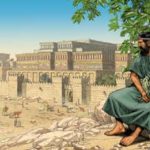An Unheralded Significance
 Show me a person who thinks that the Old Testament is only tales for children, and I will show you a person who hasn’t read the Old Testament. I am not referring principally to the fact that a lot of material in the Old Testament isn’t exactly family-friendly, though that is true. The larger point is that the Bible has far beyond enough to challenge and satisfy a grown-up intellect. Even the stories, the straightforward part of the Old Testament, hold more complexity and depth than is quickly unlocked.
Show me a person who thinks that the Old Testament is only tales for children, and I will show you a person who hasn’t read the Old Testament. I am not referring principally to the fact that a lot of material in the Old Testament isn’t exactly family-friendly, though that is true. The larger point is that the Bible has far beyond enough to challenge and satisfy a grown-up intellect. Even the stories, the straightforward part of the Old Testament, hold more complexity and depth than is quickly unlocked.
A lot of people miss it, and not only children. One reason for this, of course, is that many people don’t really read the Bible. Another reason is that the style of the narrative (as opposed to the poetry and the prophecy) is concise and businesslike and occasionally so understated you can only marvel. You have to work harder reading it because many things will not be spelled out. It’s plain, for example, that Esther and Xerxes did not have a monogamous marriage – if you catch the devil in the details. (Many people don’t. This contributes to the popular misbelief that the Book of Esther is a beautiful love story.)
One of my favorite examples of this unheralded significance comes at the very end of 1 Samuel. It concerns King Saul (as so much in 1 Samuel does) and how he was buried by the men of Jabesh Gilead. Saul and three of his sons died in a battle with the Philistines. The Philistines – this is pretty much the textbook definition of being a bad winner – then pinned their bodies to the wall of a city. And this is how the story ends:
When the people of Jabesh Gilead heard what the Philistines had done to Saul, 12all their valiant men marched through the night to Beth Shan. They took down the bodies of Saul and his sons from the wall of Beth Shan and went to Jabesh, where they burned them. 13Then they took their bones and buried them under a tamarisk tree at Jabesh, and they fasted seven days. (1 Samuel 31)
And you know at once that it was kind of them, but there is more beauty here than is readily apparent.
Jabesh Gilead played another, much earlier role in Saul’s story. His first true act as king was rescuing the people of Jabesh Gilead from an invader who had planned, after conquering the city, to gouge out the right eye of every man in it. Most debts are forgotten after forty years, but the men of Jabesh repaid the debt of the kindness Saul had shown them. Saul’s bread finally returned to him on the waters.
There is poetry in the fact that Saul’s reign, which began with him showing kindness to Jabesh Gilead, ended with Jabesh Gilead showing kindness to him. And it is all the more poignant because it is the last word in Saul’s story. There are few stories in the Bible darker or more tragic than Saul’s – the long descent, into murder and insanity and futile clawing to keep what God had given away. He had the peculiar torture of knowing the truth and not being helped by it. His last few chapters are filled with horror and despair, with the sense of being finally rejected by God  and going helplessly into the end.
and going helplessly into the end.
And then, to finish the story, the brave gratitude of the men of Jabesh – an act that looked wistfully back to a better past, a repayment of an old, old good deed that murmurs that Saul hadn’t wasted quite everything after all.
It is not redemption, not so little and so late. But it is a note of grace, at the very end.












































That’s a lovely point about Saul and the people of Jabesh Gilead. Thanks for sharing that — I’ll never look at that particular passage in the same way.